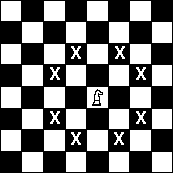The Knight's Tour, for those not familiar with it, is a puzzle involving a standard 8 by 8 chessboard, and the chess piece known as a knight.
A chess knight can move 2 squares horizontally and 1 square vertically, or 1 square horizontally and 2 squares vertically, resulting in an L-shaped move. For example, from the position depicted below, the knight can move to any of the squares marked by an X:

The challenge of the Knight's Tour is for the knight to "tour" the entire 8 by 8 chess board, using only its L-shaped move, and without landing on any square twice. If you would like to try this online before reading further, you can try it at
Be A Genius* or
Worle.com.
I myself have written about two different approaches to the Knight's Tour. I've written about a memorized approach
here, and an algorithmic approach
here and
here.
I recently ran across a great
column by Frederic Friedel, which uses the occasion of 9 year old boy performing the Knight's Tour on German TV as a jumping off point for a discussion of the classic puzzle.
Especially interesting for readers of this article will be Koltanowski's presentation, combining a giant memory feat with the Knight's Tour, and the semi-magic squares (all rows and columns, but not diagonals, add up to the same total) created using only the knight's move. Interestingly, the 150-year-old question of
whether it is possible for a Knight's Tour to trace a fully magic square (with rows, columns AND diagonals adding up to the same total) was answered only recently.
The article only lists a
Knight's Tour application for Windows, though. To remedy that, I created a
Mac OS X version (G3, G4 or G5, running OS X 10.1 or greater required). In my OS X version, you can practice hitting all 64 squares, starting and ending on the same square, and even practice starting and ending on randomly chosen squares!
To learn about the Knight's Tour in great depth, read
Knight's Tour Notes, an entire website just about the history and analysis of this fascinating puzzle.






